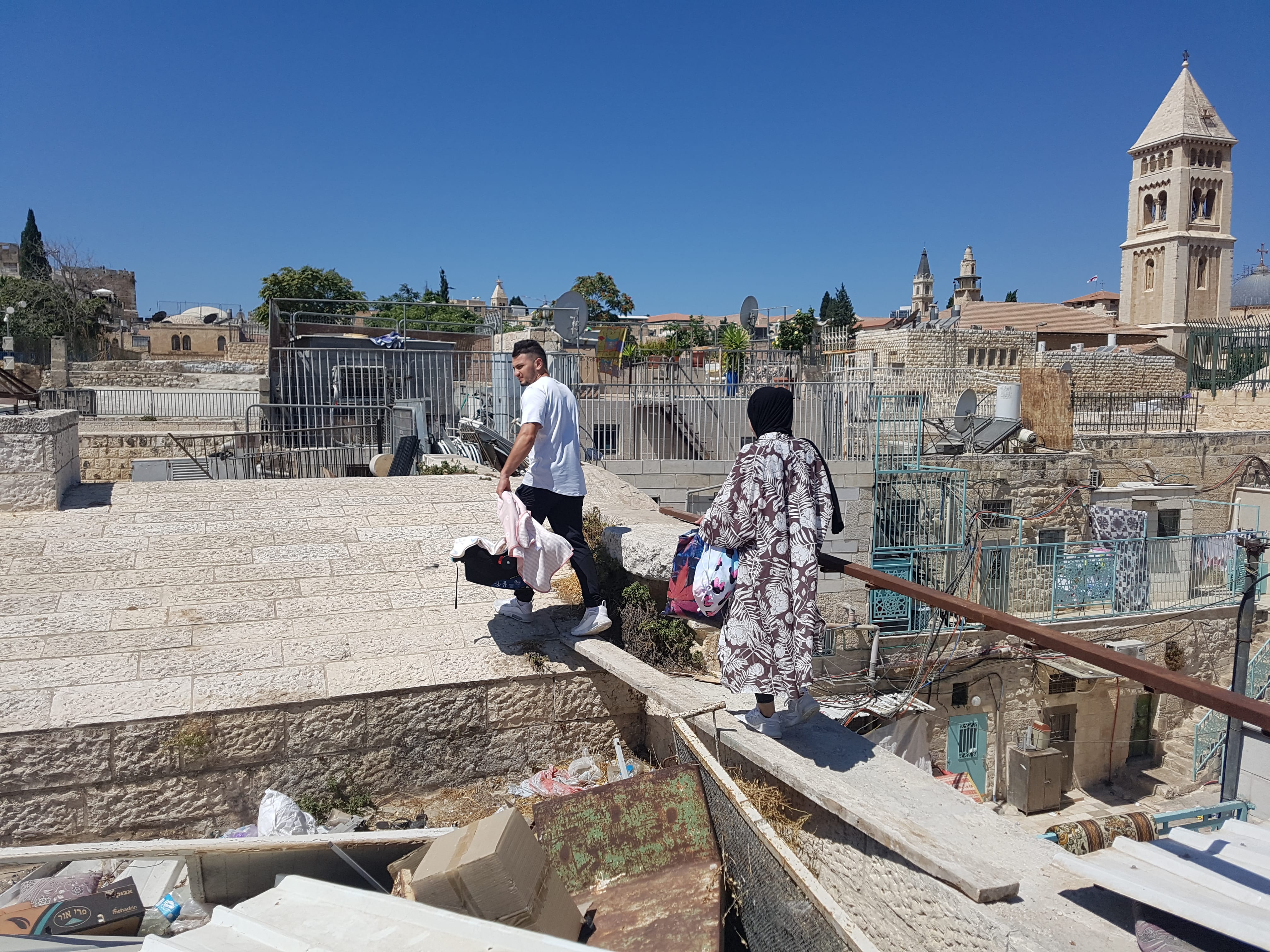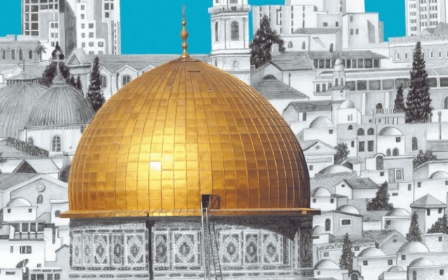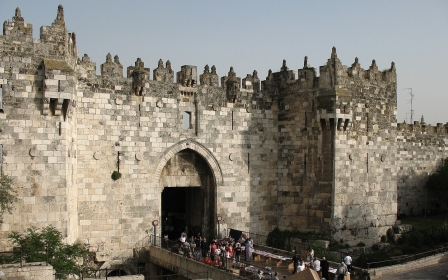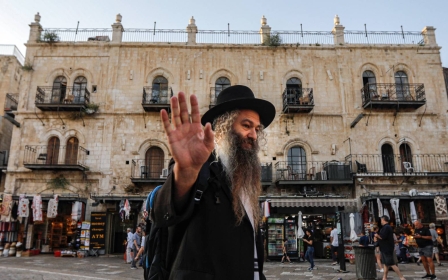Nurses' District: Damage caused by Israel's sewage works threatens Palestinian families
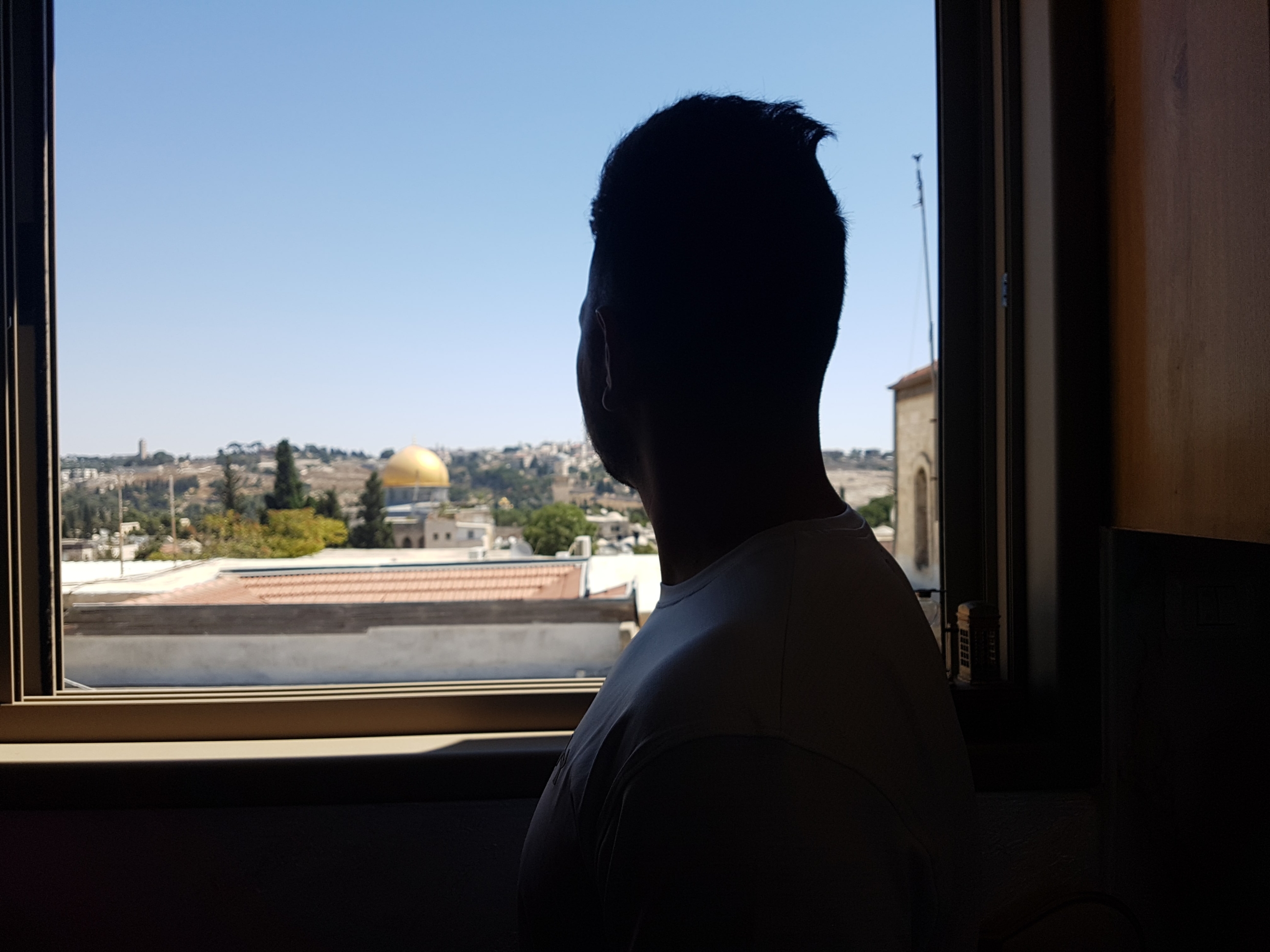
Jawdat Salaymeh can't leave his home from its main door. He has to cross wooden and iron bars connecting the roof of his home to the neighbouring buildings, and from there to the old city in occupied East Jerusalem.
The Salaymeh family are among 20 people who refused to leave their home in the Nurses' District (Hosh al-Nursat) after Israeli authorities closed the area and gave them an ultimatum to vacate their cracked homes, so that essential renovation works could be done to prevent their collapse. The families say, however, that the cracks are not their fault.
Residents of the neighbourhood, estimated to be 36 families, comprising 120 people, accuse Israeli authorities of damaging the infrastructure of homes and causing dangerous cracks, due to underground works to change pipes that had not been replaced since 1978.
New MEE newsletter: Jerusalem Dispatch
Sign up to get the latest insights and analysis on Israel-Palestine, alongside Turkey Unpacked and other MEE newsletters
At the start of 2020, the Hagihon company for Jerusalem’s water and sewage works began excavation in the area to change the water pipes. The explosion of one of the pipes under the Nurses' District caused heavy water leakage underground, which led to the movement of dirt and stones, causing the flooring in the neighbourhood's homes to collapse. There were cracks in all homes and alleyways, and severe damage.
At the time, the Israeli municipality issued eviction orders to all the homes in the neighbourhood, giving residents 30 days to leave, stressing in its engineering report that the houses are in danger of collapse and pose a danger to their residents and the neighbours.
'During my wife's pregnancy and labour, we lived through difficult and terrifying conditions'
- Jawdat Salaymeh, resident
The eviction decision even included a clause that stipulated a fine equal to $1,050 if the residents didn't evacuate their homes by the deadline in the ultimatum, in addition to paying $45 for each day that passes after the end of the 30-day period.
The residents of the neighbourhood, who suddenly found themselves caught between two difficult options - either to evacuate or live in homes that might collapse over their heads at any moment - were enraged. Most had to leave, hoping the homes would be restored within months and that they would be able to return.
This has not happened, despite two and a half years elapsing since the collapses and cracks. Budgets have been delayed, and the contractors who will be awarded the bid to restore the entrance, corridors and houses of the neighbourhood have not been chosen yet.
'Unmatched view'
Jawdat, 24, lives with his wife and newborn daughter in the upper flat of a dilapidated three-storey building, where the rest of his family also live.
"During my wife's pregnancy and labour, we lived through difficult and terrifying conditions," Jawdat told Middle East Eye. "Now I am carrying my one-month-old daughter and I am taking the same dangerous road to get out of the neighbourhood, in light of the continued closure of its entrance and the failure of the restoration process."
Despite the danger and the difficulty of his daily life, Jawdat refuses to leave the house, which he says has an invaluable location.
"This view is unmatched by anything in this world,'' he told Middle East Eye, sitting by his living-room window, which overlooks the holy sites of Al-Aqsa Mosque and the Dome of the Rock.
Even if he leaves, he will not be able to afford high rents for similar homes elsewhere in Jerusalem, estimated to be at least $1,200.
In another small home, his grandmother, Rehab Salaymeh, lives with his parents and their children. Rehab, 75, said she has lived in this place for the past 52 years and she refuses to leave, because "whoever lives in the Old City is attached to it and cannot live anywhere else".
Likewise, Hidayeh Salaymeh, Jawdat's mother, said her life has been centred around the Old City since her children first went to school. Everything in the Old City feels like home, she says, including the health centres, markets and, most importantly, the nearby Al-Aqsa Mosque.
A researcher on the history of Jerusalem, Rubeen Abu Shamsiya, said that the main base for the buildings in the Nurses' District dates back to the Mamluk period. The second floor of it was built in the late Ottoman period, while there are underground vaults from the Crusades era.
On the origins of the neighbourhood's name, he told MEE that it was called the al-Nashashibi neighbourhood in the past, but during the British Mandate period, and due to the large number of uprisings at the time, a group of local nurses created a base to treat the wounded and sick. It was also said that the first legal midwife in Jerusalem came from this neighbourhood.
Middle East Eye visited the neighbourhood and met one of its residents, Rashid Zahida, who calls himself the "guardian of the Nurses' neighbourhood". Zahida has refused to leave, fearing that his property and those of his neighbours would be vacated and become easy prey for Israeli settlers.
He is angry at the state of the neighbourhood. With the failure of restorations, he said that the explosion of a water pipe at the bottom of the neighbourhood in early 2020 was a serious accident, but it was not the first: it was preceded by several others that resulted in cracks, and were due to Israeli excavations under the Old City.
Zahida added that the people asked for help from Palestinian official authorities and Arab contractors in Jerusalem, in an attempt to push the Israeli municipality away from intervening in the restoration of the neighbourhood, for fear of attempts to penetrate and control it.
Zahida said that delays in approving the budget and appointing the contractor to restore the neighbourhood meant that "the necessary funds for the restoration were not allocated.
"This has made life difficult for residents who are eager to return to their homes, after being exhausted by the high amount of rent they pay for their rental homes," he said.
Zahida said that life in his home is getting harsher every day, with the recent start of excavation work and the interruption of water and sewage services in the neighbourhood, and thus the spread of rats. Yet he refuses to leave his home.
"My wife is pregnant with our third child and is now living with our two children in her sister's house, while I am the guardian of my home and the neighbourhood’s homes," said Zahida.
"I insist on remaining at my home, because I was born here and I refuse to leave this place unless it is to the grave. Two weeks ago we received a fine of $300 because we did not repair the homes, and restrictions surround us from every angle."
Evading responsibility
Meanwhile, Sameh Abu Asab, a Palestinian man who speaks on behalf of the Nurses' District residents, told Middle East Eye that the houses in the area were already weak due to their old construction with dirt and stones - cement and iron were not used at the time.
A lawyer hired by the neighbourhood's residents, Muhannad Jbara, said that in early 2020 he complained to the municipality and the Hagihon company, holding them responsible for the severe damage caused by infrastructure works, but they denied their responsibility and issued an order to close the neighbourhood.
In response to the residents' wishes, the lawyer decided that Palestinian institutions should take it upon themselves to restore the neighbourhood, and then file a lawsuit against the municipality and the company to pay for the expenses of the upcoming, huge restorations, which will include the entrance, internal corridors and houses.
Despite the delay in monitoring and activating the budget, the restoration process began in the first week of September, at the entrance, to be expanded later to include all homes.
According to Jbara, the municipality filed criminal charges against the residents under the pretext that they had not renovated their homes in the past, in an attempt to evade responsibility in the event of new accidents.
Regarding the danger of keeping the neighbourhood almost empty of residents, in light of its need for immediate restoration, Jbara told MEE that this might not pose a threat to the neighbourhood and population in any city in the world except for the city of Jerusalem, given settlement ambitions in the Old City and the Nurses' District's strategic and sensitive location, close to the Buraq Wall and Al-Aqsa Mosque.
Middle East Eye delivers independent and unrivalled coverage and analysis of the Middle East, North Africa and beyond. To learn more about republishing this content and the associated fees, please fill out this form. More about MEE can be found here.


